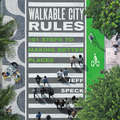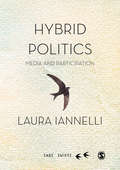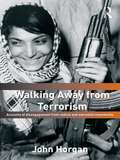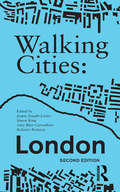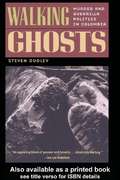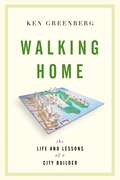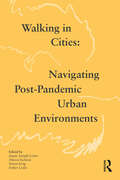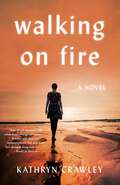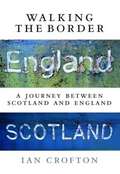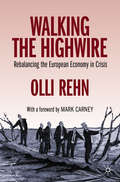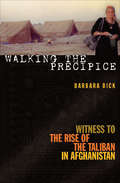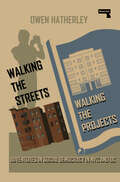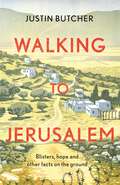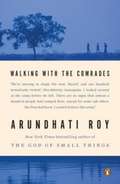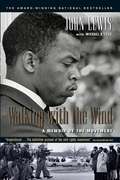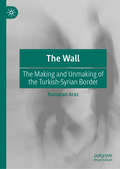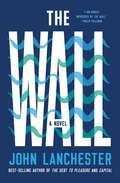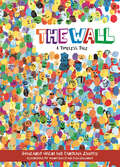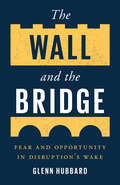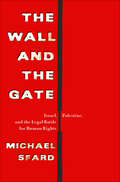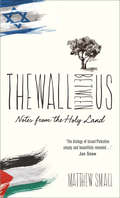- Table View
- List View
Walkable City Rules: 101 Steps to Making Better Places
by Jeff Speck"Cities are the future of the human race, and Jeff Speck knows how to make them work.”—David Owen, staff writer at the New YorkerNearly every US city would like to be more walkable—for reasons of health, wealth, and the environment—yet few are taking the proper steps to get there. The goals are often clear, but the path is seldom easy. Jeff Speck's follow-up to his bestselling Walkable City is the resource that cities and citizens need to usher in an era of renewed street life. WalkableCity Rules is a doer's guide to making change in cities, and making it now.The 101 rules are practical yet engaging—worded for arguments at the planning commission, illustrated for clarity, and packed with specifications as well as data. For ease of use, the rules are grouped into 19 chapters that cover everything from selling walkability, to getting the parking right, escaping automobilism, making comfortable spaces and interesting places, and doing it now!Walkable City was written to inspire;Walkable City Rules was written to enable.Itis the most comprehensive tool available for bringing the latest and most effective city-planning practices to bear in your community. The content and presentation make it a force multiplier for place-makers and change-makers everywhere.
Walker. Exaggerated Claims: The ESRC, 50 Years On (SAGE Swifts)
by David Walker"David Walker s analysis is incisive and hard hitting. Anyone who believes in the power of social science to inform better policy making should take his criticisms seriously. " - Sue Duncan, Former Chief Government Social Researcher and Head of the Government Social Research Service "David Walker has written an unofficial summary of ESRC's achievements and struggles. He brings to the task long experience of the organisation and of the key players, a great familiarity with the literature and a sceptical nature. The result is stimulating, instructive, contentious and sometimes even infuriating. " - David Rhind, Chair of the Nuffield Foundation What is the role of the state in distributing research money? How do 'arm's-length' funding agencies relate to public policy and business? This original study looks at the main social science funding agency in the UK, which was established 50 years ago. It examines how funding decisions are related to power. The 'critical' and policy' aspects of successful research bids are discussed. Walker asks the tricky question, why has social science research not achieved a more salient role in state policy formation and management strategy: is the funding agency responsible? Insightful, engrossing and highly original, the book will be required reading for anyone who has written or will write a Social Science research bid and, more widely, for students of power, knowledge and culture. "
Walking Away from Terrorism: Accounts of Disengagement from Radical and Extremist Movements (Political Violence)
by John G. HorganThis accessible new book looks at how and why individuals leave terrorist movements, and considers the lessons and implications that emerge from this process. Focusing on the tipping points for disengagement from groups such as Al Qaeda, the IRA and the UVF, this volume is informed by the dramatic and sometimes extraordinary accounts that the terrorists themselves offered to the author about why they left terrorism behind. The book examines three major issues: what we currently know about de-radicalisation and disengagement how discussions with terrorists about their experiences of disengagement can show how exit routes come about, and how they then fare as ‘ex-terrorists’ away from the structures that protected them what the implications of these findings are for law-enforcement officers, policy-makers and civil society on a global scale. Concluding with a series of thought-provoking yet controversial suggestions for future efforts at controlling terrorist behaviour, Walking Away From Terrorism provides an comprehensive introduction to disengagement and de-radicalisation and offers policymakers a series of considerations for the development of counter-radicalization and de-radicalisation processes. This book will be essential reading for students of terrorism and political violence, war and conflict studies, security studies and political psychology. John Horgan is Director of the International Center for the Study of Terrorism at the Pennsylvania State University. He is one of the world's leading experts on terrorist psychology, and has authored over 50 publications in this field; recent books include the The Psychology of Terrorism (Routledge 2005) and Leaving Terrorism Behind (co-edited, Routledge 2008)
Walking Cities: London
by Rosana Antoli Sean Ashton Rut Blees Luxemburg Amy Blier-Carruthers David Dernie Duncan Jeffs Esther Leslie Jaspar Joseph-Lester Adam Kaasa Ahuvia Kahane Nayan Kulkarni Sharon Kivland Douglas Murphy Jean-Luc Nancy Laura Oldfield Ford Steve Pile Peter Sheppard Skærved Phil Smith Tom Spooner Peter St. John Jo Stockham Richard WentworthWalking Cities: London (second edition) brings together a new interdisciplinary field of artists, writers, architects, musicians, human geographers and philosophers to consider how a city walk informs and triggers new processes of making, thinking, researching and communicating. In particular, the book examines how the city contains narratives, knowledge and contested materialities that are best accessed through the act of walking. The varied contributions take the form of short stories, illustrated essays, personal reflections and accounts of walks both real and fictional. While artist and RCA tutor Rut Blees Luxemburg and philosopher Jean-Luc Nancy recount a nocturnal journey from Shoreditch to the City of London; architect Peter St John of the practice Caruso St John offers a detailed and personal reflection on the Holloway Road; and architect and author Douglas Murphy examines what he calls London’s ‘more politically charged locations’ in his account of a solitary walk through an area of South London. Ultimately, Walking Cities: London seeks to understand the wider significance of changing geographies to generate critical questions and creative perspectives for navigating the social and political impact of rapid urban change.
Walking Ghosts: Murder and Guerrilla Politics in Colombia
by Steven DudleyFirst Published in 2006. Routledge is an imprint of Taylor & Francis, an informa company.
Walking Home: The Life and Lessons of a City Builder
by Ken GreenbergOne of the world's foremost urban designers shares his passion and methods for rejuvenating neglected cities and argues passionately for the importance and possibilities of their renewal.From a youth spent in the boroughs of New York City and other great cities of the world, to his beginnings as an architect in Toronto, Ken Greenberg has long recognized that cities at their best provide much of what we seek in a place to call home. Community, places of culture and business that we can walk to, mass transit and a wealth of amenities that couldn't be supported without a city's density: the mid-century drive to suburbanization deprived us of these inherent advantages of urban living. The realization of this loss, in tandem with pressing recent concerns about energy scarcity and global warming, has made us see cities with fresh eyes and a growing understanding that they can provide us with an unparalleled measure of sustainability.Ken Greenberg has not only advocated for the renewal of downtown cores, he has for thirty years designed the very means by which that renewal can happen. Walking Home is both Ken's story and a lesson in turning the world's urban spaces back into places that can give us not only a platform to face the challenges of the future, but also a place we can call, with pride and satisfaction, home.From the Hardcover edition.
Walking in Cities: Navigating Post-Pandemic Urban Environments
by Jaspar Joseph-Lester Ahuvia Kahane Simon King Esther LeslieThis book brings together an international group of artists and writers to respond to the question of how our new world orders force us to reconsider urban walking and urban spaces in ways which extend into the digital sphere of online dialogue and screen sharing. In their reflections on walking cities in lockdown, the artists and writers contributing to this book share a number of complementary themes. Key to this is the question of how we walk in post-pandemic cities and how such walking might motivate or be motivated by transgressive, atomised or collective thoughts, affects, relations and experiences. Here we see how navigating cities in lockdown requires us to re-territorialise, improvise, create and de- or re-politize. There is, for example, a clear distinction between the severe lockdown measures that were introduced in Cape Town and the liberal appeal to good citizenship that northern hemisphere cities such as Stockholm chose to rely on. These measures impact on the way we experience urban walking and, in each case, lead to deeper reflections about the heightened presence of ideological structures embedded within the urban.
Walking on Fire: A Novel
by Kathryn CrawleyGreece. Politics. Love. Danger. Reeling from a failed marriage and spurred on by a burgeoning sense of feminism, twenty-five-year-old Kate accepts a position as a speech therapist in a center for children with cerebral palsy in Thessaloniki, Greece. It is 1974, and the recent end of Greece’s seven-year dictatorship has ignited a fiery anti-American sentiment within the country. Despite this, as her Greek improves, Kate teaches communication to severely disabled children, creates profound friendships, and finds a home in the ancient and historied city. From a dramatic Christmas pig slaughter to a mesmerizing fire walking ceremony, her world expands rapidly—even more so when she falls in love with Thanasis, a handsome Communist. Through Thanasis, Kate meets people determined to turn a spotlight on their former dictators’ massacre of university students, as well as their record of widespread censorship and torture of dissidents. The more she learns, the more her loyalty to her country and almost everything she was taught in her conservative home state of Texas is challenged. Kate is transformed by her odyssey, but when her very safety is threatened by the politics of her lover, she must choose: risk everything to stay with Thanasis and the Greece that has captured her heart, or remove herself from harm’s way by returning to her homeland?
Walking Out: America’s New Trade Policy in the Asia-Pacific and Beyond
by Michael L. BeemanFrom tariff wars to torn-up trade agreements, Michael Beeman explores America's recent and dramatic turn away from support for freer, rules-based trade to instead go its own new way. Focusing on America's trade engagements in the Asia-Pacific, he contrasts the trade policy choices made by America's leaders over several generations with those of today–decisions that are now undermining the trading system America created and triggering new tensions between America and its trading partners, allies and adversaries alike. With keen insight as a former senior U.S. trade official, Beeman argues that America's exceptionally deep political divisions are driving its policy reversals, giving rise to a new trade policy characterized by zero-sum beliefs about the kind of trade America wants with the world and about new rules for trade that it wants for itself. With enormous implications for the future of regional and global trade, this timely analysis unravels the implications of America's seismic shift in approach for the future of the rules-based trading order and America's role in it. Walking Out is essential reading for anyone interested in the domestic and international political economy of trade, international relations, and the future of America's role in the global economy.
Walking the Border: A Journey Between Scotland and England
by Ian CroftonThis travelogue about one man&’s journey by foot along the border between Scotland and England blends nature, history, and politics. In this book, Ian Crofton travels on foot from Gretna Green in the southwest to Berwick in the northeast, following as close as possible the Anglo-Scottish Border as it has been fixed since the union of the crowns in 1603. Much of the line of the Border runs through a wild, overwhelmingly unvisited no man&’s land—the sort of trackless waste perfect for keeping two belligerent peoples apart? During the course of his journey, Crofton considers a number of questions like how &“natural&” are borderlines? Sometimes they follow physical barriers, sometimes an arbitrary line on a map, the compromise made by some committee of distant diplomats…Praise for Walking the Border&“There is a lot of excellent natural description in this book, alongside a number of comic encounters with humans and livestock.&” —The Guardian (UK)
Walking the Highwire: Rebalancing the European Economy in Crisis
by Olli RehnWalking the Highwire tells the story of the Eurozone Crisis from the perspective of the former Vice-President of the European Commission who was responsible for Economic and Monetary Affairs in 2010-2014. It is a comprehensive European account that covers both events and decisions in Brussels and Frankfurt and in the member states, both in distressed countries and creditor states. It also provides an economic-political analysis of the crisis and its management, recognising that the Euro was created politically, and saved politically. Thoroughly researched and based on economic analysis of the time, reports on various meetings and the author's own speaking notes and diary, this book begins with a narrative of crisis management 2009-2012, before moving on to address the beginning of the recovery from 2013-2014. It concludes with the lessons learnt from the crisis and a programme for reform of the Eurozone in the 2020s, with contemporary policy relevance. This is an entertaining and engaging account which will be of interest to a wide audience: scholars and students, practitioners and commentators of the Eurozone.
Walking the Precipice: Witness to the Rise of the Taliban in Afghanistan
by Barbara BickAn &“enthralling&” memoir of a woman who risked her life to help a people under siege and a country caught between freedom and oppression (Publishers Weekly—starred review). In 1990, sixty-five-year-old activist and grandmother Barbara Bick traveled with a women&’s delegation to Afghanistan for what she thought would be her last great adventure. Instead, Bick forged deep friendships with her Afghan hosts—only to watch in horror as the Taliban took over most of the country and instituted fiercely anti-woman policies. Eleven years later, at age 76, Bick returned to Afghanistan, travelling to the region controlled by the Northern Alliance, an anti-Taliban militia. In early September 2001, Bick walked out of a compound where militia leader Ahmad Shah Massoud was also staying. Minutes later, Taliban infiltrators assassinated Massoud—a prelude to the al Qaeda attacks on the United States. As the US government became deeply involved in Afghanistan, Bick decided to return once again to see how women were faring under the new government. In 2004, she was one of the few Western women able to bring years of experience to understanding the country&’s trauma. Walking the Precipice gives new insight into the people, politics, and culture of a country that is on everyone&’s radar—for its beauty, and for its tragic place history.
Walking the Streets/Walking the Projects: Adventures in Social Democracy in NYC and DC
by Owen HatherleyA walk through the remnants of a social democratic America, and an argument about its future.In the 1960s, a novel ideology about cities, and what was best for them, emerged in New York. Pushing against the state planning of the time, it held that cities were at their best when they were driven from the bottom-up and when organic, unplanned processes were allowed to run their course, in a spontaneous "ballet of the street". Cities were at their worst, however, when the state stepped in, demolishing lively old neighbourhoods and erecting giant, sterile, empty "projects". This book uses the method of this ideology — walking — to test how true it actually is about the "capital of the twentieth century", New York City, with a brief interlude in the capital, Washington DC.The "projects" that are walked in this book range from cultural complexes in Manhattan to New Deal-era public housing developments in Brooklyn, Harlem and Queens, from the social experiment of Roosevelt Island to Communist housing co-operatives in the Bronx, from the union-driven rebuilding of the Lower East Side to DC's magnificent Metro. For all their many flaws, they prove that Americans could, in fact, plan and build fragments of a better society, which survive and sometimes thrive today in one of the unequal places on earth. Walking the Streets/Walking the Projects takes a hard look at these enclaves, and asks what a new generation of American socialists might be able to learn from them.
Walking to Jerusalem: Blisters, hope and other facts on the ground
by Justin Butcher'What's so impressive about Justin Butcher's book is the interweaving of his personal face-to-face experiences in Israel and Palestine against the backdrop of the social and political realities there. This book displays an empathy that is unusual in discussions of that tangled and tragic situation - the kind of empathy that will be essential in arriving at any decent solution to it.' BRIAN ENO 2017 marked three important anniversaries for the Palestinian people: 100 years since the Balfour Declaration; 50 years since the Six-day War; and ten years since the Blockade of Gaza. As an act of penance, solidarity and hope, actor and musician Justin Butcher - along with ten other companions for the full route, plus another hundred joining him for various stretches along the way - walked from London to Jerusalem. This book is the record of his journey: a combination of walking journal, travel writing and pilgrim stories. It's less of a travel guide to walking across Europe and more an exploration of the many strands radiating from the Holy Land and its narrative, weaving paths across place and history, through the lives of Justin's fellow-walkers - and, of course, his own life. Between the route itinerary and the themes of Balfour and Christian Zionism, Weizmann and cordite, colonialism, Jerusalem Syndrome and Desert spirituality, Justin charts a chronicle of serendipity: happenstances hilarious, infuriating and occasionally numinous - or, as pilgrims might say, encounters with the Divine.'This is a gripping and intelligent book that everybody should read.' PATRICK COCKBURN, Middle East correspondent, The Independent
Walking to Jerusalem: Blisters, hope and other facts on the ground
by Justin Butcher2017 marked three important anniversaries for the Palestinian people: 100 years since the Balfour Declaration; 50 years since the Six-day War; and ten years since the Blockade of Gaza. As an act of penance, solidarity and hope, actor and musician Justin Butcher - along with ten other companions for the full route, plus another hundred joining him for various stretches along the way - walked from London to Jerusalem. This book is the record of his journey: a combination of walking journal, travel writing and pilgrim stories. It's less of a travel guide to walking across Europe and more an exploration of the many strands radiating from the Holy Land and its narrative, weaving paths across place and history, through the lives of Justin's fellow-walkers - and, of course, his own life. Between the route itinerary and the themes of Balfour and Christian Zionism, Weizmann and cordite, colonialism, Jerusalem Syndrome and Desert spirituality, Justin charts a chronicle of serendipity: happenstances hilarious, infuriating and occasionally numinous - or, as pilgrims might say, encounters with the Divine.
Walking to Jerusalem: Blisters, hope and other facts on the ground
by Justin Butcher2017 marked three important anniversaries for the Palestinian people: 100 years since the Balfour Declaration; 50 years since the Six-day War; and ten years since the Blockade of Gaza. As an act of penance, solidarity and hope, actor and musician Justin Butcher - along with ten other companions for the full route, plus another hundred joining him for various stretches along the way - walked from London to Jerusalem. This book is the record of his journey: a combination of walking journal, travel writing and pilgrim stories. It's less of a travel guide to walking across Europe and more an exploration of the many strands radiating from the Holy Land and its narrative, weaving paths across place and history, through the lives of Justin's fellow-walkers - and, of course, his own life. Between the route itinerary and the themes of Balfour and Christian Zionism, Weizmann and cordite, colonialism, Jerusalem Syndrome and Desert spirituality, Justin charts a chronicle of serendipity: happenstances hilarious, infuriating and occasionally numinous - or, as pilgrims might say, encounters with the Divine.
Walking with the Comrades
by Arundhati RoyFrom the award-winning author of The God of Small Things comes a searing frontline exposé of brutal repression in IndiaIn her latest book, internationally renowned author Arundhati Roy draws on her unprecedented access to a little-known rebel movement in India to pen a work full of earth-shattering revelations. Deep in the forests, under the pretense of battling Maoist guerillas, the Indian government is waging a vicious total war against its own citizens-a war undocumented by a weak domestic press and fostered by corporations eager to exploit the rare minerals buried in tribal lands. Roy takes readers to the unseen front lines of this ongoing battle, chronicling her months spent living with the rebel guerillas in the forests. In documenting their local struggles, Roy addresses the much larger question of whether global capitalism will tolerate any societies existing outside of its colossal control.
Walking with the Comrades
by Arundhati RoyFrom the award-winning author of The God of Small Things comes a searing frontline exposé of brutal repression in India In her latest book, internationally renowned author Arundhati Roy draws on her unprecedented access to a little-known rebel movement in India to pen a work full of earth-shattering revelations. Deep in the forests, under the pretense of battling Maoist guerillas, the Indian government is waging a vicious total war against its own citizens-a war undocumented by a weak domestic press and fostered by corporations eager to exploit the rare minerals buried in tribal lands. Roy takes readers to the unseen front lines of this ongoing battle, chronicling her months spent living with the rebel guerillas in the forests. In documenting their local struggles, Roy addresses the much larger question of whether global capitalism will tolerate any societies existing outside of its colossal control. .
Walking with the Wind: A Memoir of the Movement
by John Lewis Michael D'OrsoAn eloquent, epic first-hand account of the civil rights movement by a man who lived it-- an American hero whose courage, vision, and dedication helped change history.
The Wall: The Making and Unmaking of the Turkish-Syrian Border
by Ramazan ArasThrough an anthropological analysis, this book uncovers life stories and testimonies that relate the processes of separation as a result of the constructed political borders of nation states newly founded on the inherited territories of the Ottoman Empire. As it recounts ruptured social, cultural, political, religious, and economic structures and autochthonous bonds, this work not only critically analyzes the making of the Turkish-Syrian border through an exploration of statist discourse, state practices and the state’s diverse apparatuses, but further analyzes the “unmaking” border practices of local subjects in the light of local Kurdish people’s counter perceptions, discourses, family histories, narratives, and daily practices—each of which can be interpreted as a practice of local defiance, resilience, and adaptation in everyday life.
The Wall: A Novel
by John LanchesterThe best-selling author of The Debt to Pleasure and Capital returns with a chilling fable for our time. Ravaged by the Change, an island nation in a time very like our own has built the Wall—an enormous concrete barrier around its entire coastline. Joseph Kavanagh, a new Defender, has one task: to protect his section of the Wall from the Others, the desperate souls who are trapped amid the rising seas outside and are a constant threat. Failure will result in death or a fate perhaps worse: being put to sea and made an Other himself. Beset by cold, loneliness, and fear, Kavanagh tries to fulfill his duties to his demanding Captain and Sergeant, even as he grows closer to his fellow Defenders. A dark part of him wonders whether it would be interesting if something did happen, if they came, if he had to fight for his life… John Lanchester—acclaimed as "an elegant and wonderfully witty writer" (New York Times) and "a writer of rare intelligence" (Los Angeles Times)—has written a taut, hypnotic novel of a broken world and what might be found when all is lost. The Wall blends the most compelling issues of our time—rising waters, rising fear, rising political division—into a suspenseful story of love, trust, and survival.
The Wall: A Timeless Tale
by Giancarlo Macri Carolina ZanottiA king and his servant learn about the benefits of diversity and the damage that barriers can do in this colorful tale. In this moving and valuable story, a king banishes anyone who looks different than him and builds a wall to keep them away. His kingdom was once flourishing with singers and sculptors, dancers and astronomers, and everyone in between. Now, most of the people are gone. Once he sees how lonely his side of the wall has become, he realizes where he went wrong and gains a new appreciation for his diverse and talented kingdom. With a visually engaging style that makes a complex lesson simple, this story shows children how a community can be harmed when barriers are built and how it thrives when people come together. &“The Wall shows in brilliant color just how vibrant your life can be when you break down barriers and work toward inclusion, which is a wonderful message for readers of any age.&” —Katherine Kleffner, blogger, The Nerdy Girl Express &“A clever ebb and flow of colors and shapes that will have young readers, as well as the king, quickly seeing the errors of exclusionary ways.&”—Foreword Reviews &“The Wall: A Timeless Tale is a joyful celebration of diversity, bar none!&” —Storywraps &“Macri and Zanotti . . . make it clear that shutting people out only weakens a kingdom, and they do it with laughter, not argument.&” —Publishers Weekly This is a fixed-format ebook, which preserves the design and layout of the original print book
The Wall and the Bridge: Fear and Opportunity in Disruption's Wake
by Glenn HubbardAn informed argument for an economic policy based on bridges of preparation and adaptation rather than walls of protection and exclusion  &“When technological change and globalization in recent decades brought frustration over the resulting losses to jobs and communities, there were no guardrails to get these workers back on track. As this compelling book shows, our nation is going to need bridges to help people get through the unavoidable transformations.&”—Edmund Phelps, 2006 Nobel Laureate in Economics and author of Mass Flourishing Free-market economists often have noted that there are winners and losers in a competitive capitalist world. The question of how to deal with the difficult real-life consequences faced by the losers, however, has largely been ignored. Populist politicians have tried repeatedly to address the issue by creating walls—of both the physical and economic kinds—to insulate communities and keep competition at bay. While recognizing the broad emotional appeal of walls, economist Glenn Hubbard argues that because they delay needed adaptations to the ever-changing world, walls are essentially backward-looking and ultimately destined to fail. Taking Adam Smith&’s logic to Youngstown, Ohio, as a case study in economic disruption, Hubbard promotes the benefits of an open economy and creating bridges to support people in turbulent times so that they remain engaged and prepared to participate in, and reap the rewards of, a new economic landscape.
The Wall and the Gate: Israel, Palestine, and the Legal Battle for Human Rights
by Michael SfardFrom renowned human rights lawyer Michael Sfard, an unprecedented exploration of the struggle for human rights in Israel's courtsA farmer from a village in the occupied West Bank, cut off from his olive groves by the construction of Israel’s controversial separation wall, asked Israeli human rights lawyer Michael Sfard to petition the courts to allow a gate to be built in the wall. While the gate would provide immediate relief for the farmer, would it not also confer legitimacy on the wall and on the court that deems it legal? The defense of human rights is often marked by such ethical dilemmas, which are especially acute in Israel, where lawyers have for decades sought redress for the abuse of Palestinian rights in the country’s High Court—that is, in the court of the abuser.In The Wall and the Gate, Michael Sfard chronicles this struggle—a story that has never before been fully told— and in the process engages the core principles of human rights legal ethics. Sfard recounts the unfolding of key cases and issues, ranging from confiscation of land, deportations, the creation of settlements, punitive home demolitions, torture, and targeted killings—all actions considered violations of international law. In the process, he lays bare the reality of the occupation and the lives of the people who must contend with that reality. He also exposes the surreal legal structures that have been erected to put a stamp of lawfulness on an extensive program of dispossession. Finally, he weighs the success of the legal effort, reaching conclusions that are no less paradoxical than the fight itself. Writing with emotional force, vivid storytelling, and penetrating analysis, Michael Sfard offers a radically new perspective on a much-covered conflict and a subtle, painful reckoning with the moral ambiguities inherent in the pursuit of justice. The Wall and the Gate is a signal contribution to everyone concerned with the Israeli-Palestinian conflict and human rights everywhere.
The Wall Between Us: Notes from the Holy Land
by Matthew Small&“The biology of Israel/Palestine simply and beautifully revealed,&” from the author of Down and Out Today: Notes from the Gutter (Jon Snow, journalist and presenter). Writer Matthew Small traveled to the Holy Land to further his understanding of the enduring conflict between Israel and Palestine. While there, he discovered beauty, fear and suffering like nowhere else in the world. In these honest and evocative reflections, Small retells his experiences of crossing into the West Bank to work the olive harvest with Palestinian farmers. He relates his encounters with organizations that are determinedly working to sow the seeds of peace in soils that are deeply scarred by suffering and war. While reliving these unforgettable experiences, through his writing he struggles to find why the wall between these two groups of people exists. Deciding to join a group of international and Israeli volunteers, Small attempts to show that, despite the ongoing occupation, peace is not lost, but still to be discovered. &“Matthew Small, despite the horror of both the war, and the wall, works and travels both sides of the divide, and brings us to an understanding of where the seeds of peace can yet be found.&”—Jon Snow, journalist and presenter &“What is really refreshing about this book is the way Small writes from a very personal perspective, often admitting in his diary entries that he&’s unsure what to write or how he feels about the situation. His emotion surrounding his visit and the people living amongst the occupation every day is portrayed in a gritty, raw way.&”—The Bookbag
